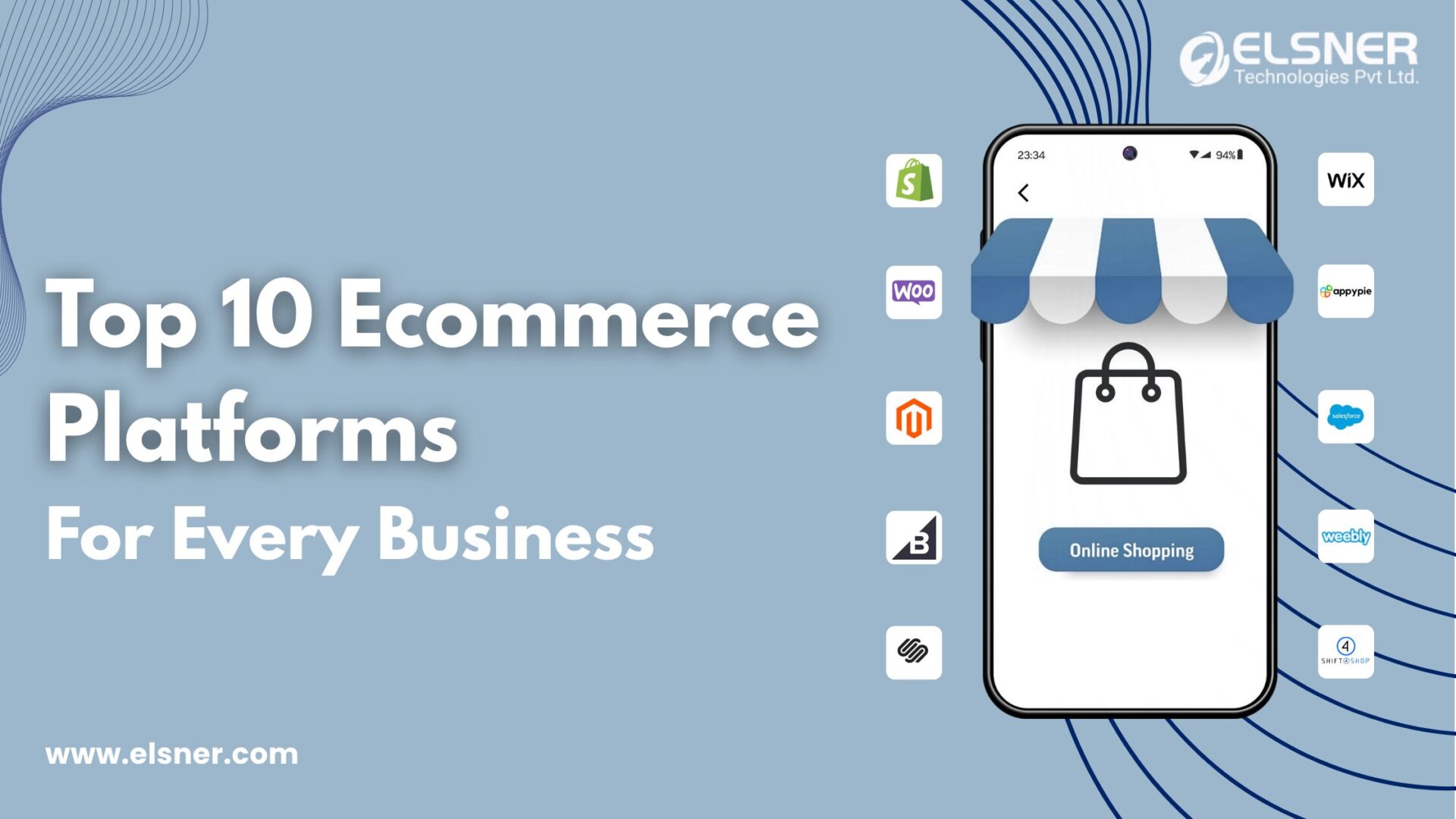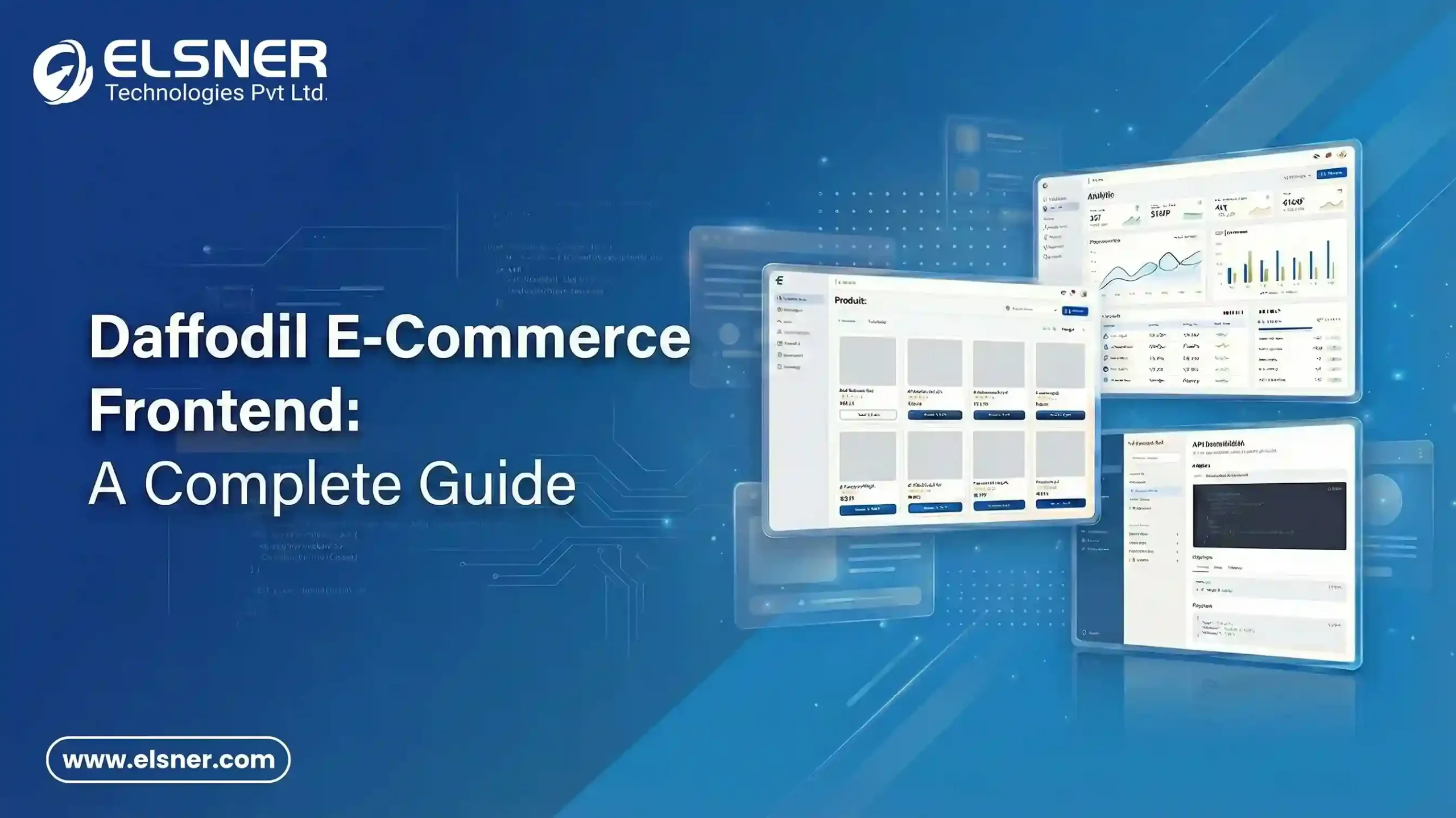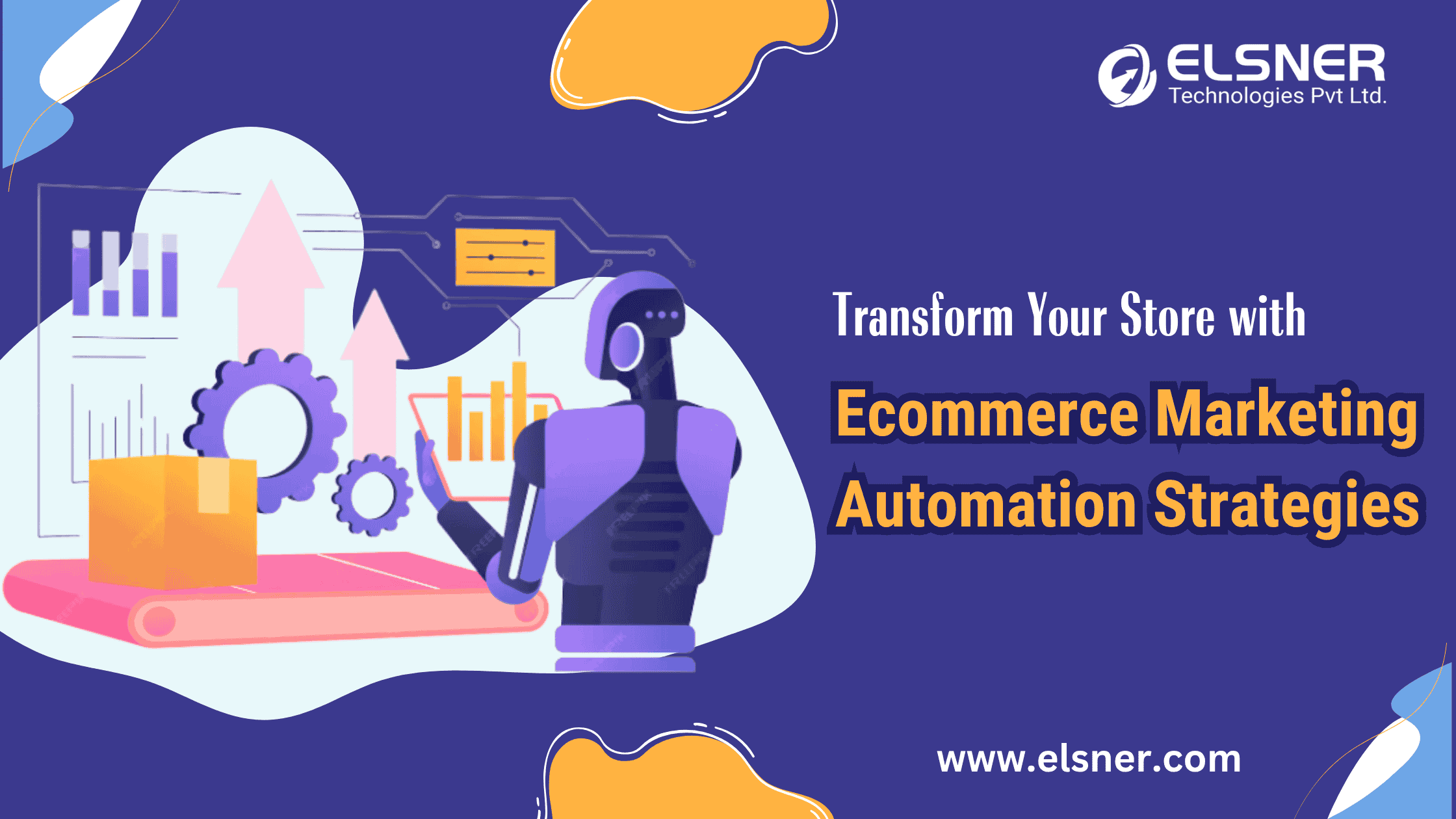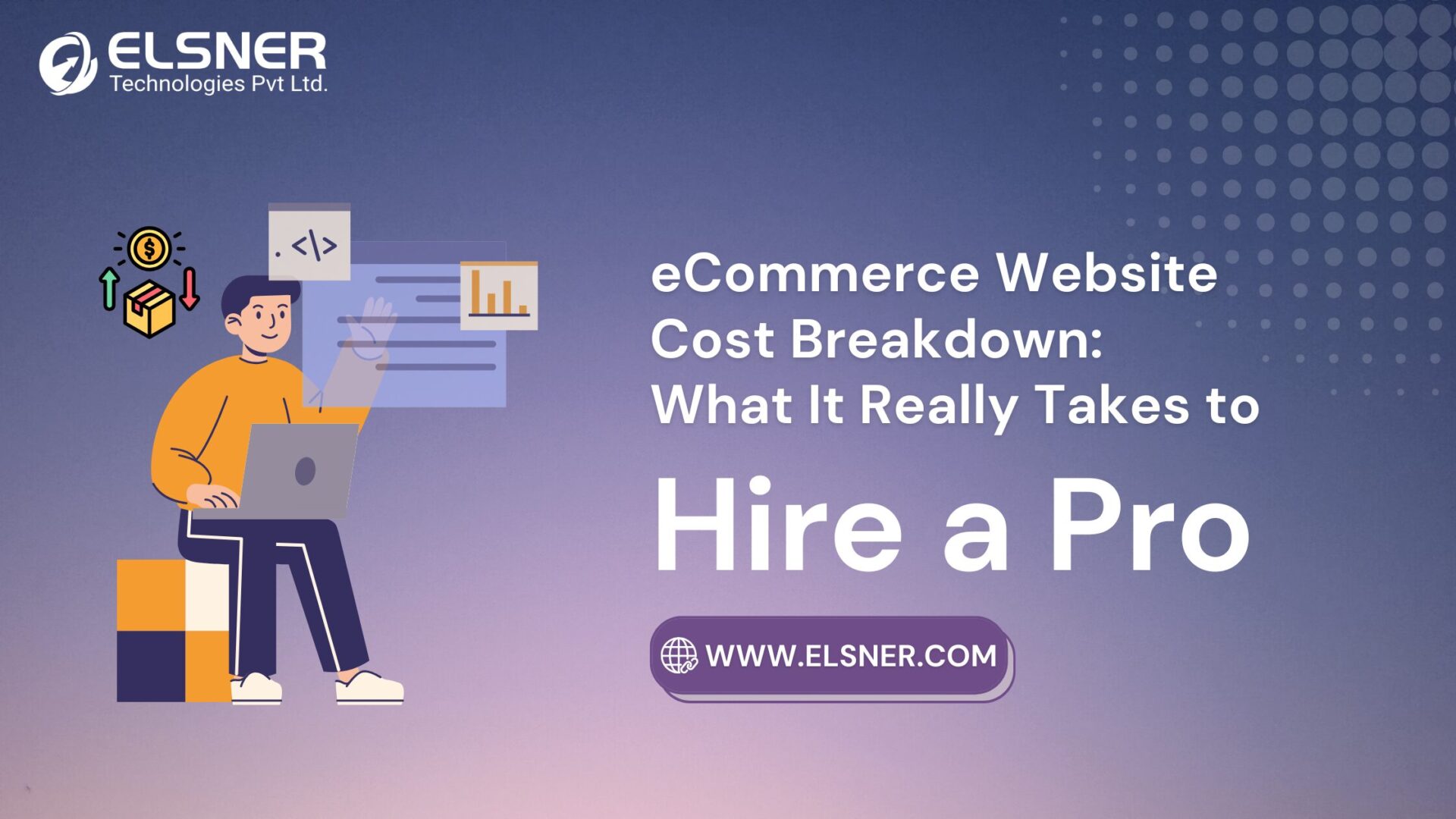- 2025 Is Not Playing Nice—Your Platform Should Not Either
- Top 10 Ecommerce Platforms for 2025
- 1. Shopify
- 2. WooCommerce
- 3. Appy Pie AI Website Builder
- 4. Squarespace
- 5. Weebly
- Ready to build or upgrade your ecommerce store?
- 6. Magento Open Source (Now Adobe Commerce Community Edition)
- 7. BigCommerce
- 8. Wix Ecommerce
- 9. Salesforce Commerce Cloud
- 10. Shift4Shop (formerly 3dcart)
- What to Look for in an Ecommerce Platform?
- Six Things You Need in 2025
- Bonus Tips from Elsner’s Playbook
- Final Pro Tip?
- How to Choose the Right Ecommerce Platform for Your Business?
- Know Your Goals
- Budget Check
- Think Long-Term
- Stay Future-Ready
- Match Your Style
- Tech-Savvy or Nah?
- Conclusion: The Future Is Now (And It Is Online)
- FAQs
- 1. What is the most beginner-friendly Ecommerce platform in 2025?
- 2. Which platform works best for large product catalogs?
- 3. Can I switch platforms later?
- 4. Is open-source better than hosted platforms?
- 5. Why partner with Elsner Technologies?
- 6. Which platform fits small or medium businesses best?
- 7. What do enterprises usually go for?
- 8. Are there any must-haves in Ecommerce platforms in 2025?
- 9. What is the best platform for an online business today?
- 10. Where do I begin with online store platforms for 2025?
One moment, you are setting up an online store. The next moment, your competitors are already testing drones for same-day delivery.
2025 Is Not Playing Nice—Your Platform Should Not Either
Welcome to 2025. If your Ecommerce platform still crashes when someone sneezes on it—Houston, we have a problem.
In a year when Ecommerce is set to rake in $7.4 trillion (Statista says so, and they rarely joke), choosing the best Ecommerce platforms is not just important. It is survival. Whether you are a basement-based startup, a growing Ecommerce platform for SME, or an unstoppable Ecommerce platform for enterprises, your platform must scale, flex, and hustle as hard as you do.
At Elsner, we do not believe in one-size-fits-nobody solutions. As an experienced Ecommerce development company, we have helped brands of every shape and size conquer cart abandonment, load time tantrums, and those “Where is the Buy button?” Nightmares.
In this guide, we will not bore you with buzzwords. We are laying out the top 10 platforms that actually deliver, ranked by customization, user-friendliness, costs, growth support, and vibes (yes, vibes matter).
Because great products deserve great homes, and smart founders (like you) deserve the tools to build empires, not just websites.
Let us find the platform that does not just sell your products but helps Ecommerce website development teams sleep peacefully.
Top 10 Ecommerce Platforms for 2025
2025 does not wait for slow tech—or slow-loading sites. Whether you are building a brand in your garage or managing 100 SKUs per second, your platform needs to move like a caffeinated squirrel. Here are the real MVPs of Ecommerce platforms 2025—no hype, just results.
1. Shopify
Founded in 2004, Shopify has become the reigning champ of Ecommerce platforms, with millions of businesses worldwide and a reputation for sleek design, scalability, and ease of use. In 2025, it’s still a top choice—whether you’re selling handmade socks or scaling a global skincare empire.
Its biggest strengths? A super-intuitive dashboard, lightning-fast loading, and integrations galore. You can literally set up a store over your morning coffee. Plus, the massive app store lets you plug in extra features as needed.
But fair warning: if SEO is a big play for your long-term strategy, Shopify’s rigid URL structure might be your nemesis. Still, if you’re focused on selling fast and growing faster, there’s a reason everyone keeps recommending it.
Pros
- Beautiful themes with minimal effort
- Fast, secure, and reliable hosting
- 1-click upsells and abandoned cart recovery
- Excellent 24/7 support
Cons
- Limited URL and metadata control for SEO
- Monthly costs add up, especially with paid apps
Cost Structure
Shopify offers a 3-day free trial with $1/month for the first three months. After that, pricing starts at $29/month (Basic), $79 (Shopify), and $299 (Advanced). Shopify Plus for enterprises starts around $2,000/month.
Elsner Tip: As a certified Shopify development company, Elsner helps businesses build bold, conversion-ready storefronts—whether you’re launching or scaling to 10,000 SKUs.
2. WooCommerce
WooCommerce still rules the WordPress ecosystem, powering over 42% of all Ecommerce stores globally. It’s a no-brainer for content-first brands and those who want complete design freedom with full SEO control.
This plugin transforms any WordPress site into a powerful online store. The setup is straightforward for those who know their way around WordPress. And the best part? It’s free, though you’ll likely spend on hosting, themes, and extensions.
If you’re a DIY enthusiast or working with a solid dev team, WooCommerce offers unmatched flexibility. But without some TLC, plugin conflicts and performance issues can creep in.
Pros
- Free core plugin
- Flexible, customizable, and SEO-friendly
- Thousands of plugins and themes
- Ideal for content-drivenEcommerce
Cons
- No centralized support (open-source = community-driven help)
- Frequent plugin maintenance is required
- It can get clunky without good hosting
Cost Structure
WooCommerce itself is free. However, expect to spend $10–$100/month on quality hosting and potentially more for premium themes or extensions.
Elsner Tip: As a WooCommerce development company, Elsner can help you create a seamless, scalable store that works as beautifully behind the scenes as it looks on screen.
3. Appy Pie AI Website Builder
If you’re looking to skip the code and launch something yesterday, Appy Pie’s AI Website Builder is your secret weapon. This 2025-ready tool lets you generate a complete website just by describing it in plain English.
Ideal for solopreneurs and small teams, it automates the build process using AI. It’s not just about websites—it builds Ecommerce-ready interfaces fast, securely, and without a developer in sight. If you’re just starting and speed is the name of the game, this one delivers.
Just keep in mind that while the tool is powerful, its AI is only as good as your input. Complex business logic might require workarounds or more advanced tools.
Pros
- No-code setup with natural language input
- Mobile-friendly and secure (HTTPS by default)
- Fast deployment with built-in themes
- Good for quick MVPs or concept stores
Cons
- Design flexibility depends on AI interpretation
- Limited for complex integrations or unique workflows
- Best suited for simpler storefronts
Cost Structure
Appy Pie offers a free version for basic websites. Paid plans for Ecommerce features start at around $18/month and scale based on features and traffic needs.
Elsner Tip: Want to start lean but look premium? Elsner can support custom builds or upgrades from platforms like Appy Pie when you’re ready for more horsepower.
4. Squarespace
Squarespace continues to impress with polished, design-centric templates and super user-friendly editing. It’s the go-to for artists, personal brands, and creatives who want an online store that looks like a million bucks without hiring a designer.
With drag-and-drop tools,Ecommerce features built in, and seamless integration with marketing tools, it’s ideal for simpler storefronts. But if you’re aiming to scale big, some limits might show—especially with payment gateway options and backend functionality.
Pros
- Elegant themes, perfect for image-rich brands
- Built-in email marketing and scheduling
- Responsive support and templates
- Integrates with ShipStation and Stripe
Cons
- Limited payment gateway options (mostly Stripe/PayPal)
- Not ideal for massive catalogs or advanced inventory needs
Cost Structure
Squarespace pricing starts at $27/month (Basic Commerce) and $49/month (Advanced Commerce), with annual discounts available.
Elsner Tip: If visual storytelling is your brand’s superpower, Elsner can help you bring it to life on Squarespace with custom tweaks that stand out.
5. Weebly
Weebly remains one of the easiest platforms to build a quick Ecommerce site—especially if you’re just getting started. Now powered by Square, it’s tightly integrated with in-person selling, making it a good choice for brick-and-mortar shops moving online.
Its strength lies in simplicity: drag-and-drop builder, mobile-responsive themes, and basic inventory tools. Don’t expect the moon, but for low-cost, low-maintenance stores? It does the job.
Pros
- Extremely beginner-friendly
- Free plan available for basic websites
- Square POS integration for physical stores
- Basic Ecommerce tools without overwhelm
Cons
- Limited customization and scalability
- Less ideal for SEO and advanced marketing
Cost Structure
Weebly offers a free tier. Paid Ecommerce plans start at $12/month and go up to $38/month, depending on features.
Elsner Tip: For small businesses or first-time sellers, Elsner can set up Weebly stores that punch above their weight, plus help you migrate when it’s time to level up.
Ready to build or upgrade your ecommerce store?
Our expert ecommerce development services help you create scalable, high-performing platforms tailored to your needs.
6. Magento Open Source (Now Adobe Commerce Community Edition)
If your Ecommerce plans include deep customization, multiple storefronts, or advanced product logic, Magento Open Source (aka Adobe Commerce Community Edition) is still a heavyweight contender in 2025.
It’s not for the faint of heart—this platform demands developer expertise. But in return, you get serious power: custom workflows, multilingual support, multi-store functionality, advanced pricing rules, and more. If you want full control, it delivers. That’s why many businesses turn to Magento website development services to harness its full potential.
Just know that Magento isn’t a quick-launch solution. It’s perfect for businesses with growth capital, long-term vision, and a trusted dev partner.
Pros
- Extreme flexibility and scalability
- Advanced catalog and inventory features
- Strong for B2B, multi-vendor, and international
- Large community and extension marketplace
Cons
- High setup and maintenance costs
- Requires developer support (open source ≠ plug-and-play)
Cost Structure
Magento Open Source is free, but hosting, development, and maintenance costs can easily range from $500 to $5,000+ per month, depending on complexity.
Elsner Tip: Elsner’s certified Magento developers build high-performance stores with custom functionality that scale without breaking under pressure.
7. BigCommerce
BigCommerce is Shopify’s more enterprise-focused cousin, with more flexibility for SEO and built-in features (minus all the app add-ons). It’s designed to help mid-market to large businesses scale efficiently, without getting locked into rigid systems.
It’s cloud-hosted, fast, and packed with native functionality like multi-currency, B2B-specific features, and headless commerce options. As a leading Bigcommerce Development Company, we recommend it if you’ve outgrown the basics and need a balance of power and usability—this one’s for you.
Just know the backend has a steeper learning curve than Shopify, and design limitations can be a bottleneck for some.
Pros
- SEO-friendly with full URL and metadata control
- No transaction fees
- Headless-ready with strong API support
- Robust native features out of the box
Cons
- Slightly more complex setup
- Theme customizations can be restrictive
Cost Structure
Plans start at $39/month (Standard), $105 (Plus), and $399 (Pro). Enterprise pricing is custom. No transaction fees, but monthly rates scale with revenue.
Elsner Tip: Need a BigCommerce store with Shopify’s ease but Magento’s muscle? Elsner’s team bridges the best of both worlds.
8. Wix Ecommerce
Wix has evolved far beyond its drag-and-drop website builder days. In 2025, WixEcommerce is a serious contender for small to mid-sized businesses that want a store fast, with full design freedom and solid Ecommerce features.
Its ADI (Artificial Design Intelligence) tool helps build layouts based on your answers, and it includes features like product galleries, abandoned cart recovery, and dropshipping via Modalyst.
It’s still not ideal for complex catalogs or large-scale operations, but for a polished, nimble store? It works.
Pros
- Easy drag-and-drop interface
- AI-powered setup options
- Built-in marketing tools and automation
- Affordable for smaller budgets
Cons
- Less suitable for high-SKU or high-traffic stores
- Limited 3rd-party app ecosystem compared to Shopify
Cost Structure
WixEcommerce plans start at $27/month (Business Basic), $32 (Business Unlimited), and $59 (Business VIP).
Elsner Tip: Wix is great for lean startups. And if you outgrow it? Elsner can migrate and scale you to a more robust platform, without the headaches.
9. Salesforce Commerce Cloud
Salesforce Commerce Cloud is an enterprise-grade, cloud-based platform that’s built for scale, personalization, and deep CRM integration. It’s trusted by global brands with high-volume operations and complex sales channels.
This isn’t a DIY solution—it’s built for serious business. Features like AI-powered merchandising, real-time inventory, and global storefronts make it a juggernaut. But with that power comes complexity (and cost).
Pros
- Seamless CRM and marketing automation via Salesforce
- AI-powered personalization (Einstein AI)
- Strong multi-site, multi-currency, and omnichannel support
- Scalable and secure for enterprise-grade traffic
Cons
- High cost and long implementation timelines
- Requires a Salesforce-savvy dev team
Cost Structure
Pricing is quote-based and typically geared toward enterprise clients. Expect minimums in the tens of thousands annually.
Elsner Tip: Elsner works with enterprise clients to build custom Salesforce Commerce Cloud solutions that blend personalization, performance, and precision.
10. Shift4Shop (formerly 3dcart)
Shift4Shop flies a bit under the radar, but it’s a rock-solid Ecommerce platform—especially if you’re based in the US and using Shift4 for payment processing. The kicker? It’s free for qualifying merchants using their payment gateway.
Beyond the free pricing, Shift4Shop offers a broad range of features like unlimited products, SEO controls, and a customizable checkout. It’s a bit more technical than Shopify, but way cheaper if you’re okay with the Shift4 ecosystem.
Pros
- Free for US merchants using Shift4 Payments
- SEO-friendly with customizable URLs
- Lots of built-in tools—no app bloat
- Good performance-to-price ratio
Cons
- Less user-friendly interface
- Limited support for global businesses
- Smaller community than other platforms
Cost Structure
Free if you use Shift4 as your payment processor (US only). Otherwise, plans start at $29/month.
Elsner Tip: Want enterprise features without enterprise pricing? Elsner can help you maximize Shift4Shop’s capabilities—and migrate when it’s time to expand globally.
What to Look for in an Ecommerce Platform?
Choosing a platform is like picking a business partner. You want reliability, adaptability, and ideally, zero meltdowns during Black Friday.
At Elsner, we’ve worked with brands of all shapes and sizes—from caffeine-fueled startups to “we-sell-to-12-countries” enterprises. So here’s our no-fluff breakdown of what actually matters when choosing one of the best Ecommerce platforms this year.
Six Things You Need in 2025
| Feature | Why It Matters (Real Talk) |
| Customization | Your business isn’t beige. Your store shouldn’t be either. Themes, plugins, apps—go wild. |
| Scalability | Today it’s 100 orders. Tomorrow? 10,000. Make sure your platform doesn’t cry under pressure. |
| Ease of Use | If it feels like launching a rocket, it’s probably not for you. Drag, drop, sell. Repeat. |
| Payments & Shipping | You want global customers? Then support their currency, language, and shipping drama. |
| SEO Tools | Great products are invisible without SEO. Google must love you, or no one will find you. |
| Mobile Optimization | If your store isn’t pocket-perfect, you’re waving goodbye to 70% of your shoppers. |
Bonus Tips from Elsner’s Playbook
- For startups and SMEs: Prioritize simplicity and growth potential. Many Ecommerce platforms for SME users go for Shopify or WooCommerce because they balance ease with power.
- For enterprise brands: Go headless or go home. Flexibility, advanced APIs, and custom workflows are a must. Tools like Magento (Adobe Commerce) are the go-to Ecommerce platforms for enterprise teams needing big builds, and with professional Magento development services, businesses can fully leverage its capabilities for scalable, customized solutions.
- Across the board: Whether you’re selling artisanal socks or automotive parts, your platform should support Ecommerce website development that grows with you—not against you.
Final Pro Tip?
Choosing among the best platforms for online business doesn’t mean picking the shiniest dashboard. It means aligning your vision with features that scale. At Elsner, we help you get there—faster, better, and with fewer grey hairs.
Need help picking the perfect fit? Your friendly Ecommerce development company is just one message away.
How to Choose the Right Ecommerce Platform for Your Business?
Let us be honest—choosing from the best Ecommerce platforms feels like dating apps. Swipe left on clunky ones. Swipe right on what clicks. But before you get heartbroken by a dashboard, do this:
-
Know Your Goals
Are you selling candles from your kitchen or managing a fashion label for dogs? Either way, your business size matters.Ecommerce platforms for SME are like comfy sneakers—supportive and budget-friendly. Do not wear stilettos for a jog.
-
Budget Check
If you are bootstrapping, spending like Bezos is a bad idea. Even Ecommerce platforms for enterprise will not help if your card declines. Stick with what scales with you, not what empties you.
-
Think Long-Term
You are not just buying software—you are signing up for a long-term relationship. No one likes surprises six months in. Choose something that grows with your hustle. Elsner, being a trusted Ecommerce development company, can help you avoid expensive exes—I mean platforms.
-
Stay Future-Ready
2025 is knocking. If your platform cannot handle mobile shoppers, TikTok integrations, or voice search, it is already old news. The Ecommerce platforms 2025 are built for speed, AI, and everything your future customers love.
-
Match Your Style
Design flexibility matters. You want your brand to feel unique, not like every store in the online mall. Go with something that lets you play dress-up but keeps the code under control. Think of the best Ecommerce platforms for online businessas your digital runway.
-
Tech-Savvy or Nah?
If coding gives you hives, avoid platforms that expect you to think in JavaScript dreams. The online store platforms for 2025come with drag-and-drop powers. No dev tears required.Ready to pick your match? Let Elsner help you swipe right on a platform that gets you, supports you, and grows with you. Not just in 2025, but well beyond.
Conclusion: The Future Is Now (And It Is Online)
2025 is not waiting. Neither should your store.
Choosing from the best Ecommerce platforms is like picking your battlefield armor. Go light, or go legendary. But choose smart.
Are you a startup? Then stick to Ecommerce platforms for SME that do not cost your kidney. Running a big league? You need Ecommerce platforms for enterprises that do not panic when your traffic spikes.
This is not just tech—it is your brand’s lifeline. The Ecommerce platforms 2025 are sleek, scalable, and ready to impress.
You want the best platforms for an online business? You have options. You also have us.
Whether you want a Magento development company for high-volume battles, a WordPress development company for creative flair, or WooCommerce development services for balanced beauty, we have got your back.
At Elsner, we do not just build stores. We build empires.
So, start exploring these online store platforms for 2025.
Your future customers are already checking out.
FAQs
1. What is the most beginner-friendly Ecommerce platform in 2025?
If clicking and dragging is your vibe, Wix and Squarespace are your best friends. Want to look like a pro from day one? Shopify—the Shopify development company favorite—is your golden ticket.
2. Which platform works best for large product catalogs?
Selling socks in 100 colors? Go with BigCommerce, Magento, or Shopware. With Bigcommerce development services or help from a solid Magento development company, your inventory will feel right at home.
3. Can I switch platforms later?
Yes. But imagine moving your house with a spoon. Not ideal. Work with a pro Ecommerce development company like Elsner and avoid that digital backache.
4. Is open-source better than hosted platforms?
Tricky. Want control and custom flair? Go with WooCommerce development services. Want peace and no server drama? Hosted wins. Either way, Elsner, a trustedEcommerce development agency, helps you choose wisely.
5. Why partner with Elsner Technologies?
Because juggling design, SEO, payments, and shipping alone is a bad idea. We do Ecommerce website development like wizards—no cloak, just clean code.
6. Which platform fits small or medium businesses best?
Ecommerce platforms for SME need to be lean, mean, and scalable. WooCommerce or Shopify work great. We help you pick the right match and stick around when it scales.
7. What do enterprises usually go for?
Ecommerce platforms for enterprises love performance. Magento and Shopware lead the pack. Big builds? We are your tech cavalry.
8. Are there any must-haves in Ecommerce platforms in 2025?
Yes. Mobile-ready, SEO-baked, integration-happy, and future-proof. Platforms in Ecommerce platforms 2025 are fast, flexible, and always selling—even while you sleep.
9. What is the best platform for an online business today?
That depends. For some, it is Shopify. For others, it is WooCommerce or BigCommerce. But if you want the best platforms for an online business, ask Elsner. We test, tweak, and tailor it all.
10. Where do I begin with online store platforms for 2025?
Start where your customers are. Then pick from the top online store platforms for 2025. Not sure? Talk to Elsner. We speak the platform like a second language.

About Author
Dipak Patil - Delivery Head & Partner Manager
Dipak is known for his ability to seamlessly manage and deliver top-notch projects. With a strong emphasis on quality and customer satisfaction, he has built a reputation for fostering strong client relationships. His leadership and dedication have been instrumental in guiding teams towards success, ensuring timely and effective delivery of services.




